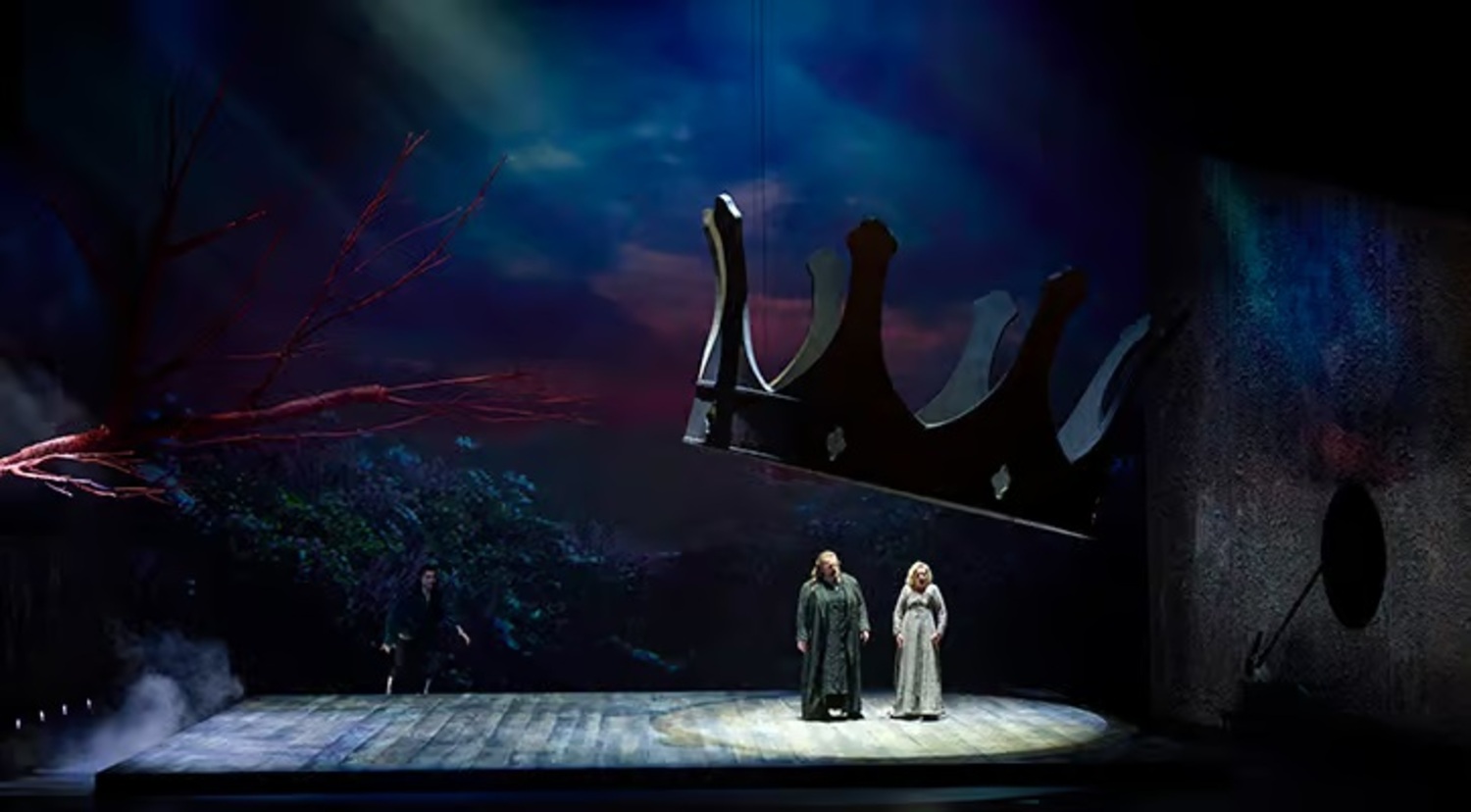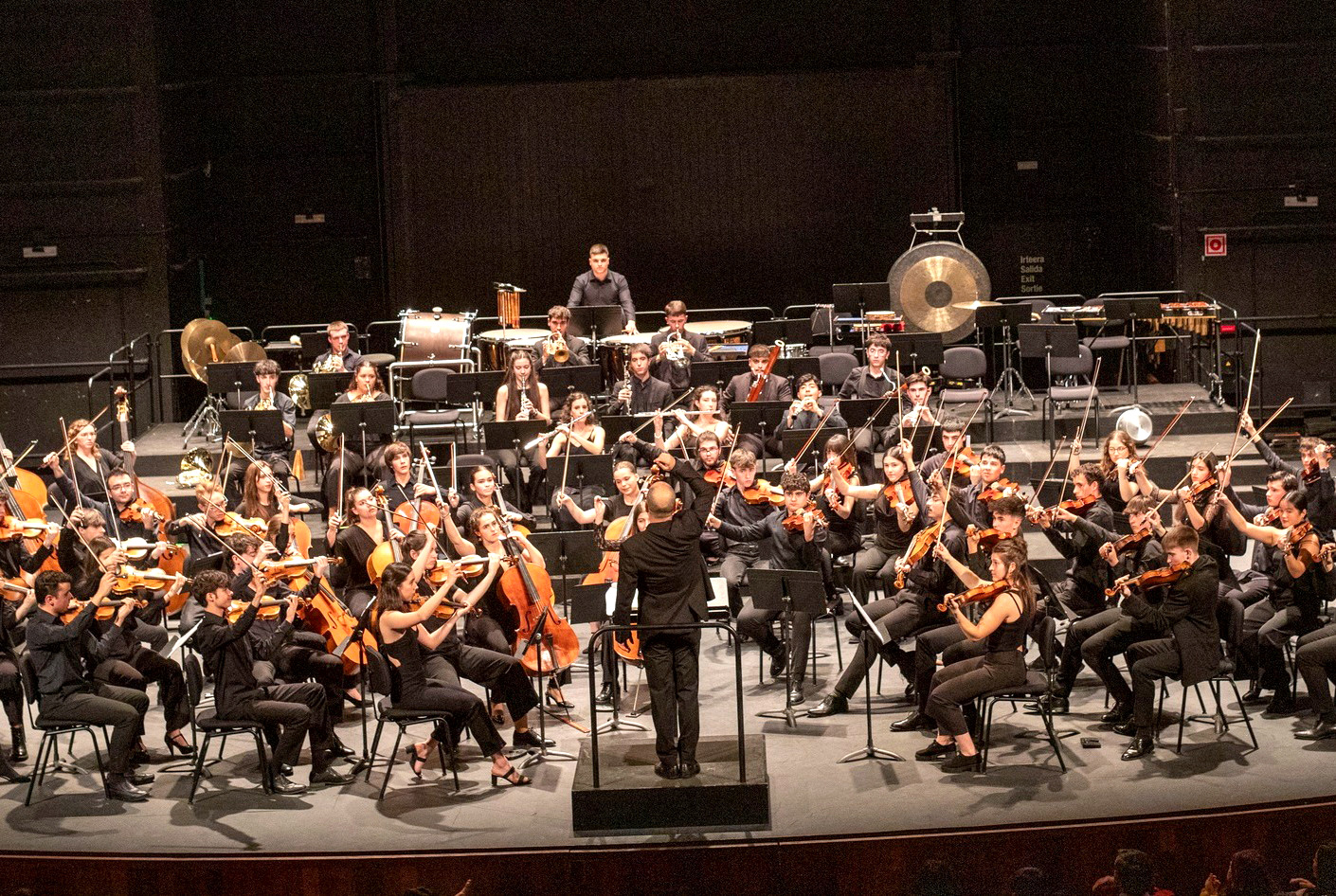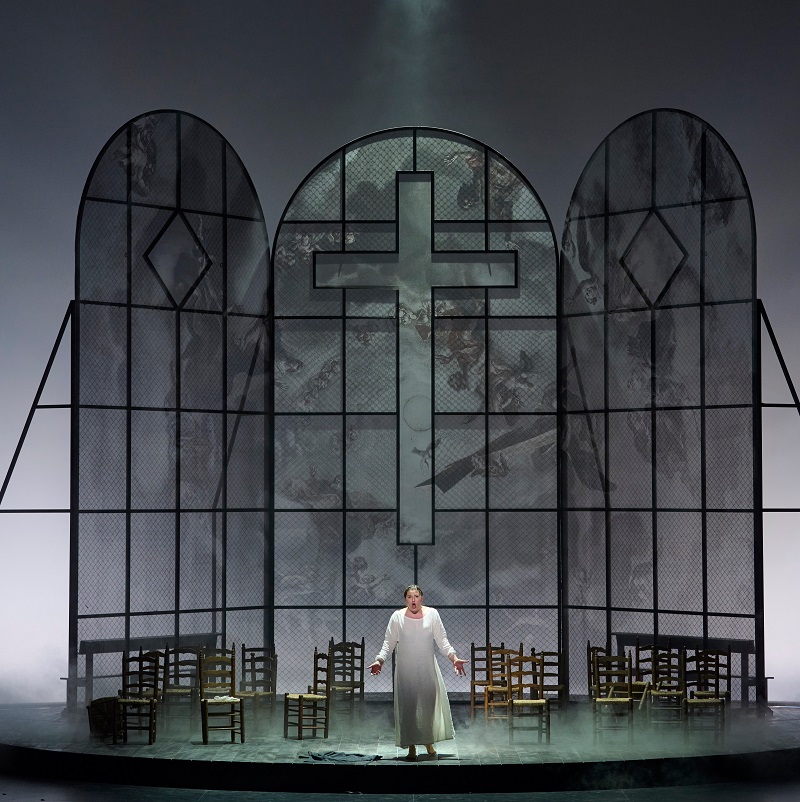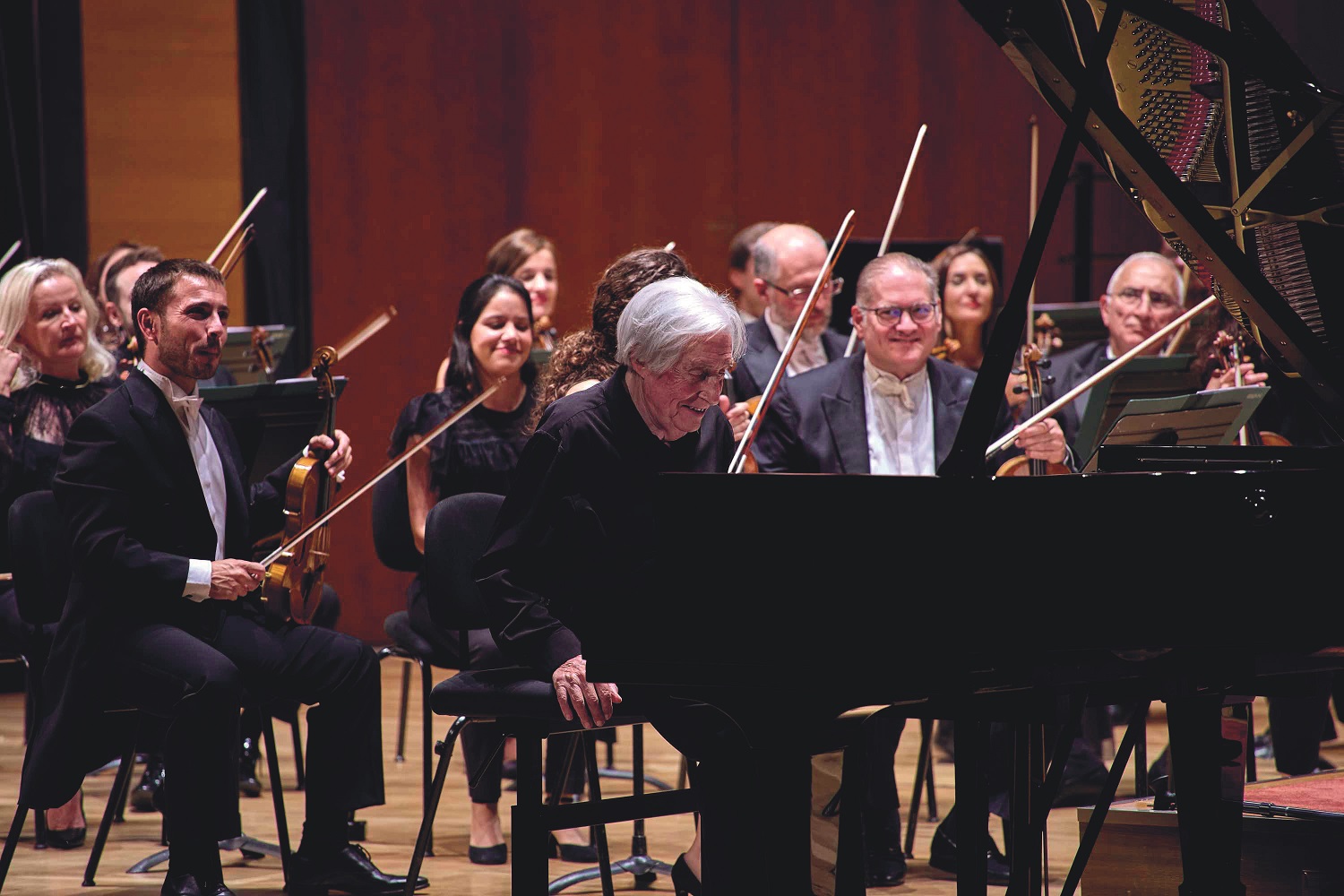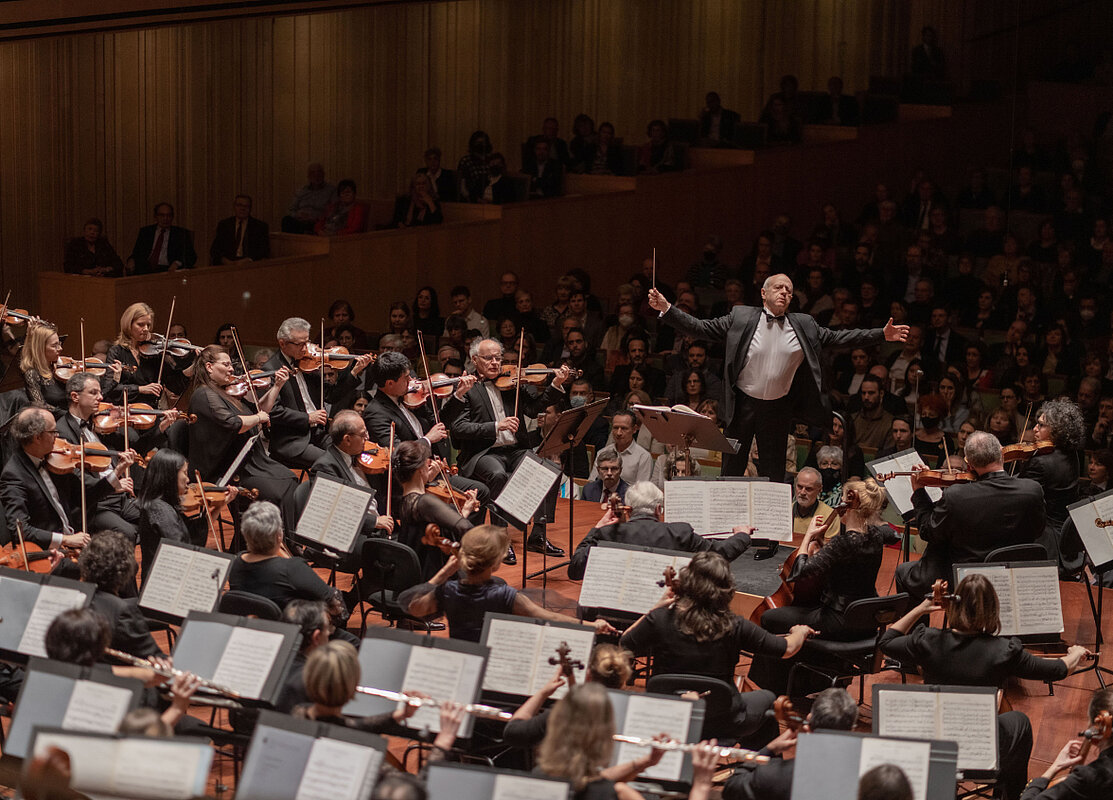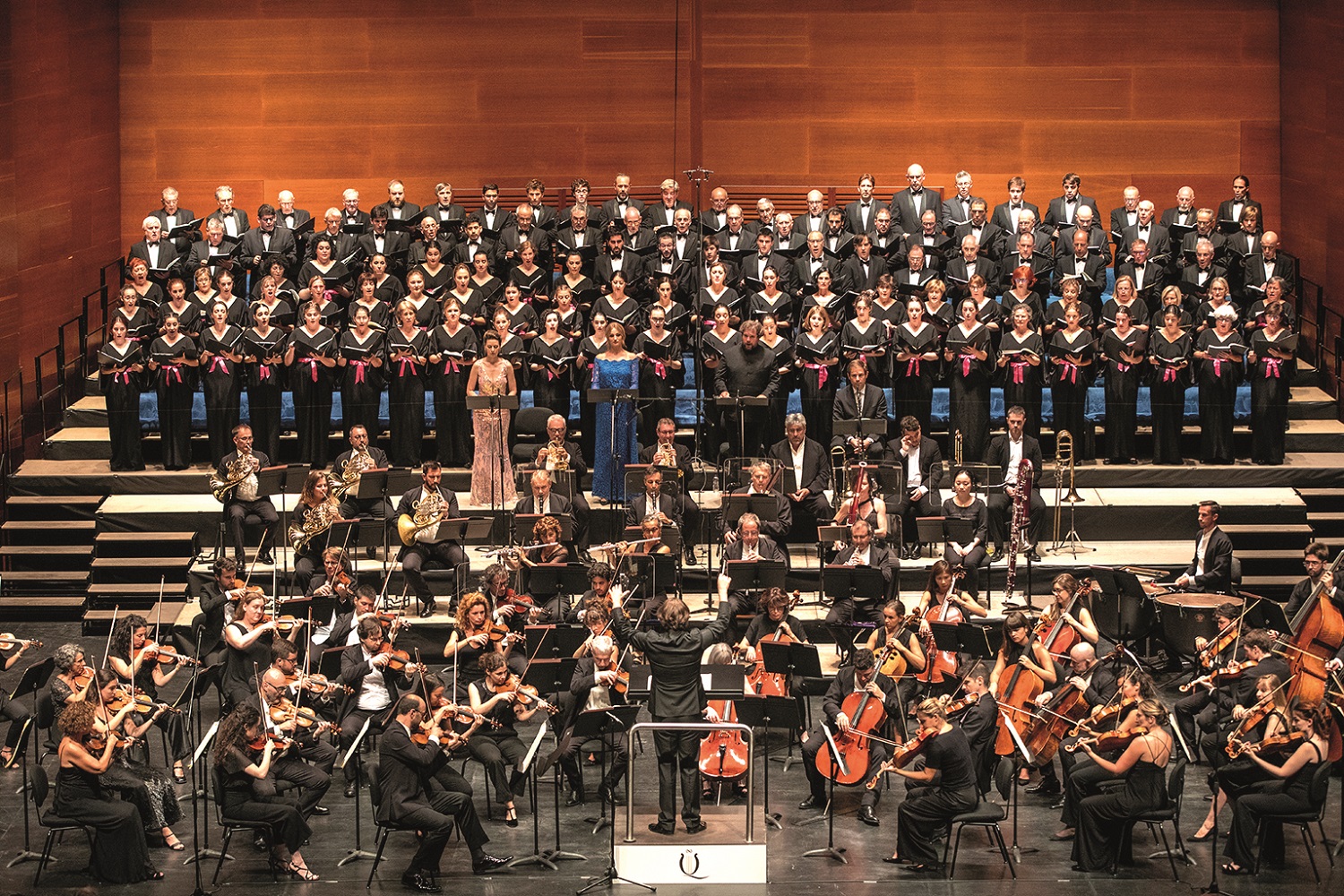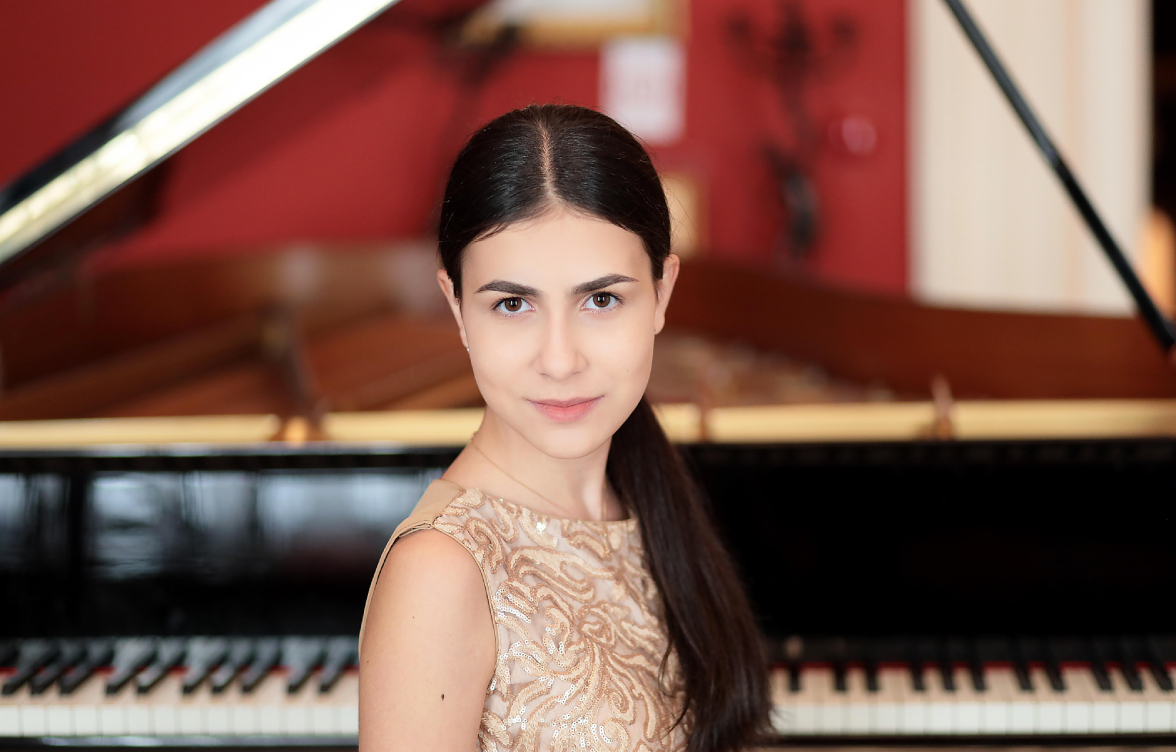"In 'The Four Seasons' I heard Basque sounds, surely Vivaldi has been in the Basque Country"
- Marina Beheretxe (Baiona, 1985) has realized from a very small moment the happiness he can bring and bring a musical melody. Its name is already known about the Basque Country. On the contrary, instead of his father's clubs, the violin has attracted music to his career. Together with the Chamber Orchestra of Tolosa, after years in the largest halls in the world, he has returned to Euskal Herria and since 2015 he has been working as a solo violin at the Iparralde Orchestra. On the other hand, Maurice Ravel, in the Conservatory, attracts the Txiribite and is in many other projects, like him, far from the classic!

Does the name Behetxe have anything special to create great musicians from generation to generation?
Who knows -- what I know is that I've emerged in this world of music. I've always lived with my grandfather and my father, at home with music and art; my mother also wants music a lot, even if I'm not a musician. So I've grown up surrounded by music.
Have you tried the battery or accordion before selecting the violin?
I tried the clubs a little bit, but since I was a kid I knew I wanted to make violin, Txiribite. My parents have told me that I was only three years old, the first time I declared that I wanted to play the violin in my life, and I think that idea has never left me. So I started at the age of seven at the Conservatory here in Baiona. Since then I have not stopped. It's my life, it's a big part of my life.
Has the musical environment helped you decide by the young professional way?
As far as I know, classical music was not heard in my house. Yes, there was also a lot of rock and roll, traditional music and music from the world. But the classic I have at home. It's true that with my parents I went a lot to concerts. I was next to my father, on stage and at concerts, and in that environment I grew up. But it is true that for my part there was already something, a small fig tree. For my part, I have also made a small trip.
It looks like you're also drawn to the atmosphere of playing village music in town.
Classical music often has a bad image. People think listening is too difficult, it's not done for them. I think it's made for everyone. So my goal and that of Philippe de Ezcurra, village to village, has been to sound that music to everybody. Then it is true that you have to choose. You can't make everything heard. Some melodies are difficult, or the ears are not used, so some melodies are strange. Others are very kingdoms and endearing. With Philippe we have selected works by Basque composers, works by Itsasi or Guridi, also by French or German composers...but there are always rich and endearing things for the Basques, for example, around dance or party music. Then, when music begins, I think they feel the pleasure that we get and we try to make it pass. I think that when we take pleasure, we transmit it and our borders break. It's just the music, the pleasure.
You have promoted different collaborations with other Basque artists, such as "Lau Sasuak".
The truth is that in my little life I've done a lot of experiences, in the classical world, in rock, in pop, in the traditional world; I've walked a lot with the dancers and it's true that I love traditional music. But once again it's a pity that all those worlds are shared, and I think you can all join together and you can create something nice.

Once I caught a glass with a friend, I was led by Vivaldi's famous work around the world: "The four seasons." There, I heard the Basque sounds. In fact, this work represents animals, it represents nature. It has familiar sounds in which I know the sounds of some Basque instruments; for example, I've heard the flutes for birds, the txalaparta for the sky, and also the pandero. In another Vivaldi movement, I clearly heard the rhythm of the fandango. I'm sure Vivaldi has been here and has danced!
This is how the idea came to me; then to complete the project, Mixel Etxekopar was essential to me. At first, he wasn't afraid, but he asked me if I was crazy to do such a project. I answered: "But if it's not there, I won't." Then he agreed to rehearse. Then Mixel is an open person and has wonderful ideas. Then we formed a group with the txalapartaris Paxkal and Paxkaline. At the Pandero we had Patrick and as we needed a violin soloist, we called a Bordeaux musician who is in Klezmer music and therefore has that traditional color, otherwise. We recorded the album in Banka, in Euskal Herria, in a small church and live; that was important, to have atmosphere and the screams of people. In that recording, we have Vivaldi's personality. His work has not been moved. We have attached all the notes; we also have beautiful colors of Euskal Herria, and those Klezmer colors in some improvisations. That's very interesting to me, mixing everyone together to create something special and endearing.
What do musicians around you say about those projects?
At first it was difficult. They asked about the reason for the project, about the goal. They thought I did something strange, or as it's said in French, I did something sticky. But when they heard them, they said that things were done well, well chosen and the result was exquisite. That was also the objective.
Do you cross the Bidasoa often with the violin?
I spent a year at the Musikene Conservatory. I was young. I was 17 years old and I finished Baiona's conservatory when I was still in high school ... So, in the meantime, I had to find something to follow the musical studies.

For example, the project 'Lau Sasuak' very much likes the people of Hegoalde. It's a pleasure for us. But it is true that I do not have many opportunities to play. In Ipar Euskal Herria, in France or in other countries I speak a lot, but less in the South. I don't like it very much. Everyone has their audience. It is true that the public varies a great deal according to the places. There are different cultures and, depending on that, there are different tastes. For example, we love Piazzolla's music, those tangos. On the other hand, they don't like it so much...Instead, Vivaldi likes "Four seasons" a lot and not so much here. Many change depending on the place.
But that's not bad, in classical music, for example, they're styles for every taste. We don't have enough of a life to hear everything and touch it! I'm interested in that.
I love them all, I would like to do everything... All I want to do with those who have pleasure. The other musicians also have to please and create. That is the most important thing for me. So I also want to make rock and roll. I love recording in the studio, or with those who have made current music, proposing improvisations, things. I love all of you whenever there is pleasure. For me, one is not better or more important than another. Everything is OK, but you have to be very small.
Classical music is often said to be heard by an elite. Is that always the case?
This also depends on where you are. Here, for example, is true. It's still hard. You just have to see the audience coming to the concerts. Most of them are white heads and we often think: "Who's left when they leave? ". That's why we talk to young people, we talk to children. We bring classical music to classrooms. We set up projects. And they love the classic! Then, that sensitivity is lost as it grows. It is important for us to work with the new generations, with the children. It's an audience tomorrow!
Sometimes, there are people who will come to the concerts with curiosity and love to be there; but there is always a difficulty to return. How to dress him? How should I be? What time should I arrive? They complicate things. It's true that sometimes in the classic audience, maybe there's a part, among the older audience, that makes things difficult. But for us, the public can begin to applaud among the movements. You can also scream ... I prefer warm cries to cold applause! It's up to us to change that, to musicians. It is true that there are programmers who set these standards. It is up to us to tell the public that they feel quiet, that they live as they want, that they have fun, because that is what we want!
How do you see the issue of the immaterial heritage of the Basque Country? What should be kept?
Our culture is very important to me, both language, dances, music, etc., and ways of doing. It is very important for me to retain them. Because more and more people come from outside, I have nothing against it, but to me it's important to show what we are. We have here a spirit, a way of living, a way of accepting people. Language is also basic. It is up to us to speak in Basque among us, but on the other hand, they have to learn. When you go to England, you obviously have to learn English, why not speak here?
Besides playing, do you want to write music?
It takes a long time to make music. Time to think, time to bore or to say, to focus on it. In fact, ideas emerge when you try harder. It takes that time. It's true that I've already composed a lot of songs. If I was on my project list, I just had to record a 30-year-old album, with my little boy and my songs. Now I'm 33 years old, and I haven't done that yet. Maybe at the age of 40, we'll see...But it's true that I already have so many songs and I like that, but I don't have enough time to immerse myself in it now. It is not in my first goals of the moment. For me, things are not located. Life is long and we have many things to do, but each of us on his turn... So, we'll see.
A dream project?
Yes. There are times when I want one thing, other times when I want something else. For example, I'd like to spend a time in Canada or in the United States to see something else. I would also like to record a record with my friends, mixing traditional and classical music; I would also like to offer concerts around the world. I have a lot of projects, but each one of them in their time.
He's also been out of Euskal Herria for a long time.
I've been in Tolosa for eight years, four of them working in the House Orchestra of Tolosa. It's a special orchestra, with just two strings. I was the second soloist, with a lot of work then. There, I would say that I've learned what the trade is like: to be an artist, to be on top of tables, repertoires, etc.

We have also travelled France. I have had the opportunity to play with great soloists such as Gautier Capuçon or Anne Queffelec. For me it has been a great experience remembering that I was only 20 years old... Every year we held an average of 100 concerts. That is a lot! I've been to Slovakia, Spain, Belgium, etc... and the experience was very good, but I didn't have time to do anything else, I wanted to walk with other musicians and, in addition, to return to Euskal Herria. As a result of all this, I risk leaving everything there, taking time and coming back here to start a new project. Then we formed a quartet with some friends and we walked through different countries in competitions, with professors of great fame ... It was another great experience.
I am currently a professor at the Baiona Conservatory and I work as a solo violin at the Iparralde Orchestra. It's the turn I have now.
Is the classic healthy in Euskal Herria?
It's true that classical music isn't necessarily the first type of music here, but that's normal. It's not so present in our culture. So for me, there's no problem. In the Conservatory, for example, we have the traditional music section, we also have the opportunity to learn theatre in Basque...I have Euskaldunes students and I teach them in Basque. I think it is important to report that things can be done in Basque and that may help us to bring classical music closer to a wider audience.
How does a violinist live in Euskal Herria?
We don't have enough of a life to hear everything and touch it! I love everyone. All I want to do with those who have pleasure.
He lives much better than in Tolosa, for example, where he loves classical music, opera, contemporary, baroque, etc. Here, on the other hand, there is a bit of classical music as well as popular music, rock... The option is broader with more possibilities. I am better here than in Tolosa.
Besides playing, you like to bring your hobby closer to people in different ways.
Yes, I offered a little chronicle for two or three years at Ensure Irratia, to briefly explain the classic. He chose a theme, explained it and made music listen. For example, I explained the composer's ideas, how and why songs were played ... Unfortunately, there too, I did not have enough time to be able to continue; perhaps at another time I might be able to start again. For me, it is very important to have this relationship with the public, with the young, with the elderly, with everyone, to generate pleasure, to give them ... I hope so!
Finally, my wish to answer a question that I have not postponed so far?
Opera 'Tristan und Isolde'
Bilbao Symphony Orchestra. Directed by: Assisted by Erik Nielsen.
The Bilbao Opera Choir. Directed by: Assisted by Boris Dujin.
The stage director: To the Allex Eagle.
The soloists: I'm talking about R. Assisted by Nicholls, G. By Hughes Jones, M. The... [+]
Basque Country Herriko Gazte Orkestra. Winter Meeting
Director: Iker Sánchez.
Narrator: Kepa Errasti.
Programme: Works by Britt and Beethoven.
Place: Victoria Eugenia Theatre, Donostia.
Day: 2 January.
-----------------------------------------------
After 27 years, we... [+]
Il Trittico de Puccini
by: Symphony Orchestra of Navarra and Opera Choir of Bilbao.
Scene address: Paco Azorín.
Soloists: The great C. Alvarez, A. Blancas, M. Berti C. Isotton, K. Mattila, A. Ibarra, S. Esparza e I. The hotel.
Where: Euskalduna Palace of Bilbao.
... [+]
When we talk about French composers, we think of Claude Debussy and Ravel. There are those who have fun defending one or the other as the best French composer of all time. Frankly, two geniuses have been absolute, as a result of the circumstances of their time. They were a very... [+]
Opera groups Don Pasquale de
Donizetti: OSE and Bilbao Opera Choir.
Soloists: S. Orfila M.J. Moreno, F. Demuro, D. Del Castillo, P.M. Sánchez.
Stage Director: Emiliano Suárez.
Scenography Alfons Flores.
Place: Euskalduna Palace
Date: 19 October.
... [+]
Concert organized by the Columbus Foundation within the RenHagan Music Festival.
Bilbao Symphony Orchestra.
Address: Ramón Tebar.
Soloist: Joaquín Achúcarro.
Programme: Works by Guridi, Grieg and Brahms.
Place: Euskalduna Palace of Bilbao.
Date: 13 September.
... [+]
Quincena Musical of San Sebastian Orchestra
of the Basque Country: Address: J. Rohrer.
Orfeón Donostiarra: Address: J.A. Sáinz Alfaro.
Soloists: The great C. Reiss V. Karkacheva M. Schmitt, H. Müller-Brachmann.
Programme: In the Solemnis Mass of Beethoven, op. 123.
Place:... [+]
Sheet: Quincena Musical from San Sebastian. Kursaal Auditorium Cycle.
Orchestre Philharmonique de Radio France
Address: Mikko Franck
Soloist: Sol Gabta (cello).
Programme: Works by Debussy, Lalo, Ravel and Stravinsky.
Place: Auditorium Kursaal.Fecha: 30... [+]
Sheet: Quincena Musical from San Sebastian. Kursaal Auditorium Cycle.
Orchestra Filarmónica della Scala de Milan. Address: Riccardo Chailly
Programme: Works by Tchaikovsky and Ravel.
Place: Kursaal auditorium.
Date: 27 August
Perhaps the philharmonic of the Scala of... [+]
Sheet: Quincena Musical from San Sebastian. Cycle Victoria Eugenia.
Alexandra Dovgan (piano).
Programme: Works by Beethoven, Schumann, Rachmaninov and Scriabin.
Place: Victoria Eugenia Theatre. Date: 19 August.
The great composer Luciano Berio said that the virtuosos... [+]
Orchestra Budapest Festival. Address: Ivan Fischer.
Orfeón Donostiarra. Address: José Antonio Sainz Alfaro.
Soloists: Anna Lena Elbert (soprano), Olivia Vermeulen (contralto), Martin Mitterrutzner (tenor), Hanno Müller-Brachmann (low). Place: Audit Kursaal.Fecha: 18... [+]









